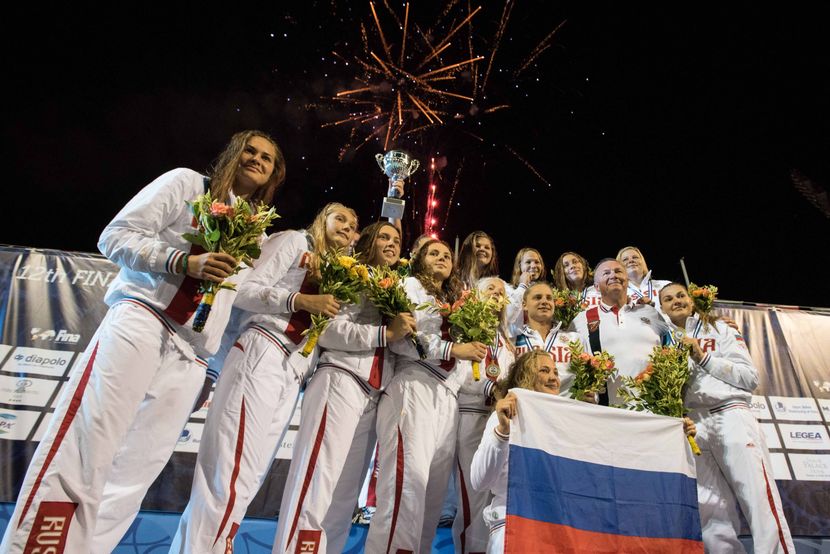
Russia is the new world junior champion after winning one of the most thrilling finals this competition ever seen. In front of 2,500 spectators in Volos, the Russians managed to overcome host Greece in the penalty shootout. The bronze medal went to the Netherlands after a fine win over Spain.
Writing history has always been a strong tradition in this land, at least for a couple of thousand years. Now another chapter was in sight, not weighing as much as the battle for the ancient Troy but significant in the world of water polo. So far no country has been able to clinch both the men’s and women’s junior world titles in the same year. Now, after the men’s team stunning triumph in Belgrade in mid-August, the women were just 32 minutes away to make Greece the first NF to make the unique double.
We can add: in the 32th minute Greece was 5cm away to achieve this feat, but the last shot taken in a man-up hit the cross-bar and bounced down just in front of the goal-line. It stood 9-9, this could have been the winning goal, instead the penalties decided the gold medal.
The final itself was a thriller, what came next went beyond all imaginations. The Greeks survived three misses as their goalie delivered a save after each, but the fourth one meant the end of the drama, Russia converted the next and won the match in the 11th round of the shootout.
The new world champions: team Russia with the trophy - Credit: Apostolos Zacharakis
What made the whole story even more dramatic that it was the tournament’s best player and the top scorer, Eleni Xenaki who missed the crucial last penalty – which also meant that Greece had to settle for silver despite being the only unbeaten side in the games’ regular time. Still, no one argued against the Russians’ victory: the world youth champion side from two years ago offered the finest of water polo once more, their sparkling attacks were simply amazing – in the final they scored six action goals, not needing too much 6 on 5s (they got only one, plus two penalties).
The runner-up Greek team with OC Chairman and FINA Bureau Member Dimitris Diathessopoulos
The Netherlands clinched the bronze medal, partly thanks to an outstanding individual effort by Lizette Rozeboom who scored 5 goals and partly to their spectacular man-down defence: the Spaniards netted their first two extras but couldn’t convert the following seven. Also, they scored three goals in the first period but only three in the remaining 24 minutes – in the meantime the Dutch did a splendid job and fully deserved to stand on the podium.
The happy bronze medal winners: the team of the Netherlands
In the morning matches the United States won a strange encounter against Hungary to finish 5th. Hungary took a 1-2 lead early but their reserves were only enough to produce a high level in front of their own goal, the stronger US players outpowered them in defence, shutting them out for the last three period. The Americans’ attacks weren’t that effective as in most of the matches on the previous days, missed all their extras, but were still good enough to net four action goals to secure another win.
Italy finished seventh, they beat Canada 7-4, with the same margin they did in the group stage.
Volos was a worthy host, as always, the amazing atmosphere in the last three days, created by the thousands gathering around the pool, will be a really long lasting memory for all being present.
Individual awards
Best player: Eleni Xenaki (GRE)
Top scorer: Eleni Xenaki (GRE)
Best goalkeeper: Evgeniia Golovina (RUS)
Final rankings
1. Russia
2. Greece
3. Netherlands
4. Spain
5. United States
6. Hungary
7. Italy
8. Canada
9. China
10. Australia
11. New Zealand
12. Serbia
13. Japan
14. Slovakia
15. South Africa
16. Croatia